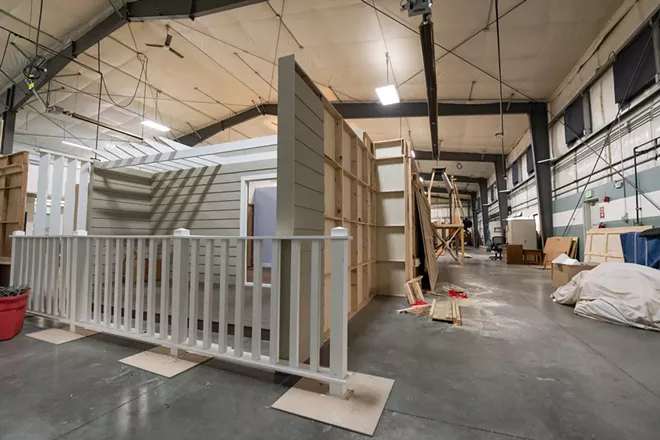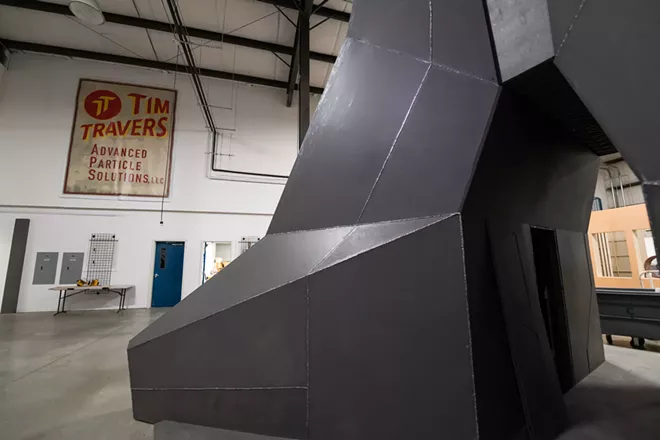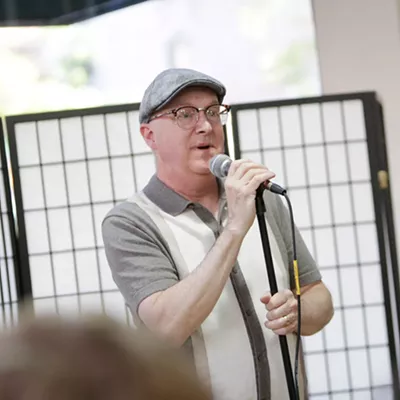Nobody is going to mistake the warehouse sprawl off the main drag in Airway Heights for Hollywood.
But within the confines of Studio A, that's kind of the point.
The new home of Going Local Productions looks completely nondescript from the outside — just a big industrial building that could be a boring storage facility. But once one enters the space, it can be a world of wonder, packed with time machines, hospitals, radio stations and human-sized hamster wheels. To put it simply, Studio A is breathing new life into the local film and television industry.
The space was first discovered by producer Casey Cowan in spring 2021 while he was doing location scouting for writer/director Stimson Snead's short film Tim Travers and the Time Traveler's Paradox. There were many elements which made it ideal: The space had two large open spaces that could be separate soundstages (around 12,000 and 8,000 square feet, respectively), high ceilings, office space, a remote location that would keep noise pollution minimal, and space for crew, props, wardrobe, catering and other on-set essentials.
The production rented the space for Tim Travers and subsequent projects including the feature film Dreamin' Wild, the radio station sitcom Live + Local and the dramatic hospice streaming series Going Home. Eventually, producers grew so enamored with the building that a consortium of North by Northwest founder Rich Cowan, Going Home creator Dan Merchant, and real estate investors with Goodale & Barbieri Company came together to buy the space from its previous owners in May 2022. They've since gone about upgrading the facility — adding edit rooms, a color correction suite, server rooms and many other post-production features in order to make Studio A a one-stop shop for filmmaking — one that rivals pretty much any space outside of major metropolitan cities.
"What this will cost me in LA would be an inconceivable fortune. And I would get functionally nothing better," says Snead during a visit to Studio A while he was shooting Lab Rats, the follow-up short to Tim Travers. Snead also recently shot a feature-length adaptation of Tim Travers in the space.
"This place is a humongous amount of actual stage space. Dozens of side rooms. This is basically a Grade-A movie stage," Snead continues. "The only real difference between it and the stuff back in Los Angeles is the curved ceiling, and it's not soundproofed. But one of the joys of places like Airway Heights is [there's not a lot of noise]."
"I've been to a lot of different second and tertiary film hubs. I get to see studios all over the place. This is actually the best I've seen outside of LA, which is impressive," says Ben Yennie, an executive producer of the Tim Travers feature.
Spokane has been a good location for some film and TV productions over the years because of the area's diverse architecture and scenery. It's why a show like the Merchant-produced zombie series Z Nation worked here. Within 30 miles, filmmakers can shoot deserts, lakes, mountains, good neighborhoods and bad neighborhoods. But the region never had a studio hub like Studio A.
"Los Angeles has all the sound stages and the best ones you would ever need. So if you're just going to shoot on a soundstage, you wouldn't leave Los Angeles," says Merchant. "But what you get in the Northwest is a variety of beautiful scenics. You get a variety of architecture in Spokane, where you can shoot on the street and it looks like Boston and shoot on another street and it looks like Philly or whatever. So there's a lot of the location work that the state has been famous for through the years, but we never had the support of a studio facility."
The amount of space allows them to build full sets for a series like Going Home and keep them intact while still shooting other projects. This proved to be a smart move, as Going Home was a top show on Sony's Christian-entertainment streaming platform (Pure Flix) and got picked up for a second season, which will start shooting this February.
"The nice thing about it is we can build and have standing sets. In the past, on all of our movies and stuff, it was almost all location-based. We would pull the whole circus, if you will, into a neighborhood," says Rich Cowan.
"We still need that sometimes of course, but particularly when you're on a TV show, you have that police station or that courtroom or that apartment that you keep coming back to, so it's way more efficient to build it in a space like this and you can always have access to it," he continues. "You control a lot more variables when you're inside a studio than when out in a neighborhood. It's kind of like your base, if you will. All your stuff — your wardrobe, art department supplies and all these kinds of things — can be in a facility like this, which we haven't had in the past. We can just be more efficient with the infrastructure."
Beyond the obvious benefits for studios and filmmakers, Studio A is also a major boon to Spokane-based production crewmembers: the camera people, makeup artists, editors, all the behind-the-scenes folks. In order to keep and retain talent for local productions they need to stay busy.
"The union crew needs about 100 workdays a year for their medical [benefits] to kick in," says Cowan. "So that's always our goal."
"We're trying to continue to add shows and movies and things like that on a more regular basis so the talented and experienced crew we have now doesn't have to spend half the year in Mississippi or Atlanta or Seattle or Los Angeles or wherever the rest of the work is," adds Merchant.
Since Washington state is notoriously not great at providing incentives for film productions, anything to streamline the process makes potential projects more willing to come to Spokane to shoot. Our city isn't going to turn into the new Hollywood anytime soon, but at least there can be an even more cohesive and thriving local film industry.
"That's a whole idea," says Cowan. "We want this to be a place where people can come and be part of the industry in different disciplines, and just share and be around each other and have that sort of synergy that this industry needs." ♦






















